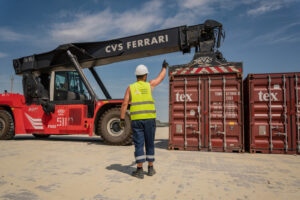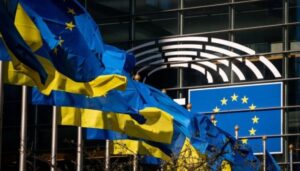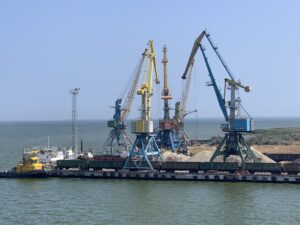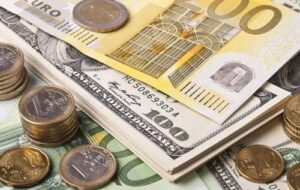
In 2024, Lemtrans, Ukraine’s largest private rail transportation operator, increased its investments by 2.9 times compared to 2023 to UAH 478 million, while total transportation volume decreased by 6% to 15.9 million tons.
“Lemtrans continues to work to ensure the logistics and economic stability of Ukraine by supplying critical raw materials and investing in new infrastructure projects… In 2024, the group allocated more than UAH 478 million for infrastructure and logistics projects, which is three times higher than in 2023, when investments amounted to more than UAH 160 million,” Lemtrans’ press service said on Tuesday.
The company has invested in the development of terminals and container business, allocating UAH 441 million in this area, the statement said.
In the second half of 2023, the construction of a modern container terminal in Vinnytsia was completed. Lemtrans also continued to implement an investment program aimed at maintaining the railcar fleet and further improving the efficiency of railcar repair facilities. The volume of scheduled and current repairs of freight cars in 2024 reached 5,635 units.
Lemtrans’ total transportation volume in 2024 amounted to 15.9 million tons, which is 6% less than in 2023, the press service reported.
Coal accounted for the bulk of transportation – 10.9 million tons. Iron ore was the second largest (2.3 million tons). In addition, the company transported 2.01 million tons of construction materials and 0.6 million tons of other cargo in 2024, the report said.
“Starting from the third quarter, coal transportation decreased due to the massive attacks by Russia on Ukraine’s energy infrastructure. Damage to production assets led to a reduction in transportation volumes by shippers,” the company’s press service explained.
Based on the results of their activities in 2024, the companies that are part of the Lemtrans group transferred more than UAH 712 million in taxes and fees to the budgets of all levels. This is 30% less than in 2023, when UAH 929 million was paid.
“In 2024, Lemtrans transferred about UAH 647 million to the state budget. Local budgets were replenished by UAH 66 million. In addition, Lemtrans Group paid more than UAH 59 million in unified social tax, the press service said.
“Despite the challenges of wartime, we continue to invest in infrastructure projects… The container terminal in Vinnytsia expands the access of Ukrainian enterprises to world markets, contributing to the growth of export-import operations and strengthening the economic potential of both the region and the country as a whole. This is especially important in the current environment, when economic sustainability is a key factor for Ukraine,” Lemtrans CEO Volodymyr Mezentsev said, as quoted by the press service.
Earlier it was reported that Yegor Grebennikov, co-owner of the port operator Transinvestservice (TIS), will become a co-owner of the Mostyska Dry Port project in Vinnytsia, which Lemtrans is implementing jointly with Rail Investment. The relevant permission was granted by the Antimonopoly Committee.

At the first “EU-Ukraine Investment Conference” in Warsaw on Wednesday, the European Union called for mobilizing private investment in areas critical to Ukraine’s recovery, the European Commission (EC) said.
“Under this call, EU businesses, including joint ventures or consortia involving both European and Ukrainian companies, are invited to submit proposals by March 1, 2025. Proposals will be reviewed and linked to the most suitable investment projects financed by the Investment Framework for Ukraine, which is an integral part of the EU’s EUR 50 billion Ukraine Fund,” the EC communiqué says.
“Ukraine’s recovery requires both public funding and partnerships with the private sector. By combining these efforts, we can maximize investment, support the country’s recovery and its gradual integration into the EU single market. Indeed, facilitating private sector participation in Ukraine’s recovery and reconstruction will be key to its success,” said Oliver Vargey, European Commissioner for Neighborhood and Enlargement Policy.
The European Commission named the priority areas of the EU’s call: development of sustainable energy solutions, including renewable energy projects and modernization of existing energy infrastructure; investment in processing of critical raw materials – key minerals and resources needed for high-tech industries and renewable energy technologies; revitalization and modernization of the manufacturing and production sector to increase industrial competitiveness; support for construction and reconstruction of Ukraine; and support for the development of the energy sector.
The two-day conference, according to the EC, brought together more than 5,000 participants, including companies, banks and investors from Ukraine, the EU and other countries, to mobilize private investment in the recovery, reconstruction and modernization of Ukraine.

Insurers in 2024 will focus on increasing investment in private markets, clean energy infrastructure and innovative technologies. According to the Reinsurance News website, this is according to the 13th annual Global Insurance Report by asset management company BlackRock.
For the third consecutive year, the report found that the majority of insurers plan to increase private market allocations, with 91% of respondents indicating they will do so in the next two years.
That figure reaches 96% for insurers in Asia Pacific and North America. The report is based on information from 410 insurance investors in 32 markets managing approximately $27 trillion in assets.
“With 2024 expected to be a landmark election year, insurers are increasingly concerned about how political uncertainty could impact macroeconomic risks, citing regulatory changes (68%) and rising geopolitical tensions and fragmentation (61%) as top concerns,” the report notes.
In addition, market risks such as interest rate volatility (69%) and liquidity problems (52%) were identified as critical.
Despite these challenges, 74% of insurers have no plans to change their current risk profiles. Many insurers cited the value of partnerships in improving their internal expertise for risk assessment and portfolio management, with 40% of respondents emphasizing that an investment partner that understands both their insurance business and operating model is critical to achieving their strategic goals.
In the public markets, 42% of insurers plan to increase investments in government and agency bonds, while 33% focus on inflation-linked bonds, as 46% view inflation as a significant macroeconomic risk. In addition, 44% of insurers are looking to increase their holdings in cash and short-term instruments to maintain liquidity.
BLACKROCK, clean energy, INNOVATION, INSURERS, INVESTMENT, private markets

Foreign direct investment (FDI) in mainland China’s economy in January-April fell 27.9% year-on-year to 360.2 billion yuan ($49.7 billion), according to the country’s Ministry of Commerce.
That included 58.5 billion yuan in FDI last month, the lowest since November. The figure fell 36% year-over-year and 32% month-over-month.
In January-April, about 12.7% of total investment was in the PRC’s high-tech sector.
As reported, FDI in 2023 fell 8% to 1.13 trillion yuan.
Experts Club Analytical Center and Maxim Urakin released a video analysis of how the GDP of the world’s countries has changed in recent years, more video analysis is available here – https://youtu.be/w5fF_GYyrIc?si=BsZmIUERHSBJrO_3.
Subscribe to Experts Club YouTube channel here – https://www.youtube.com/@ExpertsClub
CHINA, EXPERTS CLUB, GDP, INVESTMENT, MACROECONOMICS, URAKIN

The state intends to attract private investors to lend to projects for the repair, modernization, reconstruction, and construction of strategic port infrastructure facilities in Ukraine with the possibility of compensation for the funds spent through port dues.
The relevant provisions are contained in the draft resolution of the Cabinet of Ministers “Some issues of compensation for investments made by business entities in strategic port infrastructure facilities that are state-owned”, the text of which is posted on the website of the Ministry of Community Development, Territories and Infrastructure (Ministry of Health) for discussion.
The document provides for the approval of the procedure and conditions for concluding agreements on the basis of which investments made by business entities in strategic port infrastructure facilities are compensated, as well as amendments to the Cabinet of Ministers Resolution No. 899 of October 3, 2012, according to which public sector entities may make expenditures on capital investments, in particular on port infrastructure facilities, in the absence of an approved financial plan.
It is noted that the amount of investment compensation should not exceed the amount of funds actually paid by the investor to finance the design or construction of port infrastructure facilities.
In addition, it is noted that the investor may be a legal entity or an individual entrepreneur. There may be several investors at one facility.
At the same time, the new procedure will not apply to legal relations involving business entities that make private investments in port infrastructure facilities on the basis of agreements concluded under public-private partnerships, including concession agreements and lease agreements for state property.
The Ministry of Reconstruction expects that the adoption of this resolution will help restore strategic port infrastructure facilities, accelerate the growth of maritime transport, improve the competitiveness of seaports and increase their investment attractiveness.
“Due to the military aggression of the Russian Federation against Ukraine, there is a problem of insufficient funding for the maritime industry, in particular due to imperfect fiscal policy, which leads to a lack of funds at the state-owned enterprise Ukrainian Sea Ports Authority (USPA),” the explanatory note to the draft resolution says.
It is noted that the USPA has entered into contracts for a number of construction projects, but “due to lack of funds and the state’s dividend policy, it is not possible to implement even part of these projects.”
At the same time, the USPA is facing an acute issue of the need to reconstruct and maintain port infrastructure, including berthing facilities. As of February 24, 2022, the state-owned enterprise had 265 berths (cargo, auxiliary, passenger) located in 13 seaports of Ukraine. Of this number, 20 are unsuitable for normal operation, 37 require significant investment in the next five years, and more than 50 operate with low economic efficiency – they need to be restored through overhaul or reconstruction.
In addition, it is indicated that, according to preliminary calculations, in the period before the full-scale invasion, the need for USPA to finance projects for the reconstruction, modernization and construction of berths alone (more than 48 projects, of which 36 are for reconstruction and modernization) was estimated at UAH 12 billion over four years.

The volume of foreign direct investment (FDI) in the economy of mainland China in January-February 2024 decreased by 19.9% compared to the same period last year and amounted to 215.1 billion yuan ($30 billion), according to the Ministry of Commerce.
In particular, the inflow of foreign investment in the high-tech sector increased by 10.1% to 28.27 billion yuan.
At the same time, France’s foreign direct investment in China in January-February increased by 6.9 times in annual terms, Spain’s – by 5 times, Germany’s – by 2.4 times.
Over two months, 7.16 thousand new enterprises with foreign capital were registered in the country, which is 34.9% more than in January-February 2023, Xinhua reports.
“The 34.9% growth is the highest in the last five years. This indicates that multinationals are still optimistic about the development opportunities of the Chinese market,” a ministry spokesperson told the agency. – “Despite the decline in the volume of actually utilized FDI in the first two months, this is the third highest figure in the last ten years.
“At present, the favorable factors for attracting foreign investment in China outweigh the unfavorable ones, and the investment prospects are still bright,” the ministry representative added.
As reported, the volume of FDI in 2023 decreased by 8% and amounted to 1.13 trillion yuan.